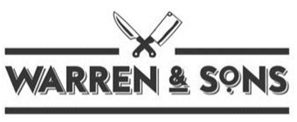Contact
June 1, 2021
Philip Warren & Son (PWS) is a family butcher, based in Launceston, Cornwall, which has traded for a considerable period at the high-end of the local retail and wholesale market mainly under the name PHILIP WARREN and PHILIP WARREN & SON and used the following logo:

PWS issued proceedings against the well-known supermarket, Lidl Great Britain Ltd, for passing off in respect of its use of the mark WARREN & SONS, largely in the following logo form, in respect of a range of fresh meat products sold in its stores in the UK in significant quantities between 2015 and 2020:

PWS’s current turnover is in excess of £11 million per year and it has about 100 staff. By 2015, it had a significant local trade around Launceston, a very limited online retail business and a significant wholesale business, through which it mainly supplied leading restaurants in London and elsewhere.
As for Lidl, while it trades largely in own brands at the less expensive end of the market it also sells some higher end produce. In 2014, it rebranded some of its fresh meat produce ranges under the mark WARREN & SONS as an own brand. Products under the brand were launched nationwide in June 2015, including in a Lidl store in Launceston close to PWS’s main outlets.
Lidl abandoned the brand before PWS first complained to Lidl and its use of the mark ceased altogether in 2020. PWS’s claim was for a substantial financial remedy, based on an historical per item royalty or account of profits in respect of Lidl’s past sales.
Decision
The trial focussed on the extent and nature of PWS’s goodwill and whether the evidence showed that Lidl’s use of its WARREN & SONS mark for the goods in question were a misrepresentation as to a relevant trade connection and, if so, whether this occurred to a significant extent.
Confusion/deception
Mr Daniel Alexander QC, sitting as a Deputy Judge of the Chancery Division, found that PWS had clearly built up a substantial goodwill in the wholesale trade with restaurants and high-end establishments in and around London by 2015.
The small amount of evidence from this sector demonstrated that apart from a momentary questioning in a WhatsApp message, there was no evidence that anyone had been led even to question whether the WARREN & SONS products sold in Lidl were connected with PWS. Only one wholesale trade witness suggested that the presence of WARREN & SONS in Lidl had even been raised.
In Mr Alexander’s view, given that this end of the restaurant business was, as the evidence showed, rather brand conscious, if the presence of WARREN & SONS in Lidl had been thought to be connected with PWS it would have been raised regularly. He would have expected people in this sector to be concerned if they thought such an association would be made by consumers.
Mr Alexander was also satisfied that no damage had been caused to PWS’s goodwill in this sector. No witness pointed to evidence of financial loss to their business as a result of Lidl’s actions. There was also no evidence that the presence of Lidl’s brand had had any impact on any of PWS’s wholesale opportunities during the five-year period. In fact, PWS’ wholesale business enjoyed growth to unprecedented levels during the very period during which millions of packs of WARREN & SONS banded meats were being sold in Lidl.
As for retail customers local to Launceston, there was no dispute that in 2015 PWS had goodwill as a retailer of high-end meats trading prominently under WARREN or WARRENS in and around Launceston. This goodwill was likely to have existed among a significant number of customers who were also customers or potential customers of Lidl in the local area.
As for misrepresentation, Mr Alexander said that, although the respective marks had considerable similarities and WARREN was the main element, they were, in each case largely presented to the public in logo forms, which were very different. Therefore, even if a customer thought the businesses might be related, there were other factors pointing the other way. In other words, Lidl’s branding was not inherently deceptive in the sense that, without the need for evidence showing its actual impact, it was prima facie obvious that a significant number of customers were likely to be deceived.
Further, the produce and the end of the market at which it was sold was different and while there was some overlap in customers for PWS and Lidl in Launceston, this was unlikely to be overwhelming and there was very limited evidence of it elsewhere. The context in which the produce was encountered was also very different.
In addition, there was no evidence of reports of confusion having been made by customers in the local Launceston Lidl, and no PWS customers appeared to have raised any objection with Lidl to it selling such produce. Any customer raising a query in a PWS shop was told that PWS produce was not sold in Lidl. Mr Alexander said that the fact that there was no such material was significant in the circumstances.
Moreover, the evidence of actual confusion was thin. What there was tended to be more questioning rather than assuming any connection between the undertakings. According to case law, if the predominant reaction of the public is not to assume there is a connection but to raise a question, that is not enough for a passing off case.
Finally, even if the intensity of belief of connection was higher than Mr Alexander thought likely, the numbers of those who had acted on that false belief were not sufficient for real damage to have been done to PWS’s goodwill as a result.
As for retail customers remote from Launceston, Mr Alexander said that any goodwill that PWS had existed among a relatively small number of people. It was unlikely that the sale of Lidl WARREN & SONS produce would have involved any material degree of operative misrepresentation because: (i) there was no solid evidence that those who knew of PWS and its WARREN brand were also Lidl customers; and (ii) even if some customers were confused, it was rapidly dispelled by PWS explaining the position before such confusion became operative.
Accordingly, considering the evidence as a whole, Mr Alexander found that it was very unlikely that Lidl’s customers, certainly outside of Launceston, would have heard of PWS in the first place and it was very unlikely that Lidl’s customers who also knew of PWS, whether in or near Launceston, would have been confused into believing there was any kind of association between the WARREN & SONS products and PWS.
Damage
There was no evidence of diversion of sales anywhere or that Lidl had been advantaged by any association with PWS. Therefore, Mr Alexander said, Lidl’s actions had not done any material damage to PWS. The most damage done to PWS’s goodwill would have been, at the highest, very tiny.
Even if he were wrong, Mr Alexander said that this was not a case in which damages on the basis of an alleged “user principle” would have come into play. Such an approach would mean Lidl paying PWS a non-trivial percentage of its sales over the entire lifetime of the brand on every WARREN & SONS branded pack sold in its stores, even in towns where no-one who shops in Lidl had ever heard of PWS, let alone been confused to any degree.
Although National Guild of Removers & Storers Ltd v Silveria (t/a CS Movers) [2010] EWPCC 15 could possibly be read as suggesting that such user damages were a normal remedy in a passing off case where use had ceased, Mr Alexander said that he did not understand it as establishing a proposition of law that if a claimant has shown some prospect of relevant confusion in some part of the country or to some part of the public, such that a passing off claim succeeds to some extent, he/she is then automatically entitled (in effect) to a share in the profits of all of the defendant’s sales, wherever made, including in places where and to people who have never heard of the claimant’s mark or business. It was unlikely that the judge in that case had intended to lay down such a principle. The law of passing off was not designed to provide a general remedy to a trader against actions by another trader that made it harder to exploit its own goodwill, but which were not founded on an operative misrepresentation as to trade origin.
In summary, even if there had been proof of damage in a general sense sufficient for liability in passing off, it was implausible that such would have translated into damages or an account of profits at anything approaching the levels or on the basis suggested by PWS. The findings relating to liability had not resulted in PWS missing out on financial compensation of the kind suggested.
The claim was dismissed. (Philip Warren & Son Ltd v Lidl Great Britain Ltd [2021] EWHC 1097 (Ch) (30 April 2021) — to read the judgment in full, click here).
Expertise